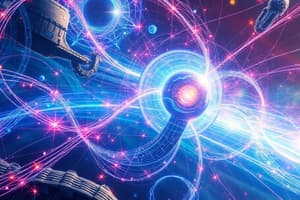Podcast
Questions and Answers
What does Newton's second law of motion state?
What does Newton's second law of motion state?
- For every action, there is an opposite reaction.
- Energy cannot be created or destroyed.
- An object in motion stays in motion unless acted upon.
- F = ma (Force equals mass times acceleration). (correct)
Which of the following laws states that entropy of an isolated system can never decrease?
Which of the following laws states that entropy of an isolated system can never decrease?
- First Law of Thermodynamics
- Law of Universal Gravitation
- Second Law of Thermodynamics (correct)
- Third Law of Thermodynamics
What type of waves require a medium to travel?
What type of waves require a medium to travel?
- Electromagnetic waves
- Mechanical waves (correct)
- Transverse waves
- Sound waves
What does Snell's Law relate to?
What does Snell's Law relate to?
Which of the following phenomena is included in modern physics?
Which of the following phenomena is included in modern physics?
What does Faraday’s Law of Induction describe?
What does Faraday’s Law of Induction describe?
Which unit is not part of SI Units?
Which unit is not part of SI Units?
What technique is used to check equations for dimensional consistency?
What technique is used to check equations for dimensional consistency?
Flashcards are hidden until you start studying
Study Notes
Key Concepts in Physics
-
Mechanics
- Studies motion and forces.
- Includes kinematics (motion description) and dynamics (force and motion).
- Newton's Laws of Motion:
- An object at rest stays at rest unless acted upon.
- F = ma (Force equals mass times acceleration).
- For every action, there is an equal and opposite reaction.
-
Thermodynamics
- Focuses on heat, energy, and work.
- Laws of Thermodynamics:
- Energy cannot be created or destroyed, only transformed.
- Entropy of an isolated system can never decrease.
- Absolute zero is unattainable.
-
Electromagnetism
- Studies electric charges, magnetic fields, and their interactions.
- Key components:
- Coulomb's Law (force between two charges).
- Ohm’s Law (V = IR, voltage equals current times resistance).
- Faraday’s Law of Induction (changing magnetic fields produce electric current).
-
Waves and Oscillations
- Studies repetitive motions and wave behavior.
- Types of waves:
- Mechanical (require medium, e.g., sound).
- Electromagnetic (do not require medium, e.g., light).
- Properties: wavelength, frequency, amplitude, speed.
-
Optics
- Study of light behavior and properties.
- Includes reflection, refraction, and dispersion.
- Key principles:
- Snell's Law (relation of angles in refraction).
- Lens formulas (1/f = 1/do + 1/di for lenses).
-
Modern Physics
- Focuses on atomic and subatomic phenomena.
- Includes:
- Quantum mechanics (behavior of particles at quantum level).
- Theory of relativity (effects of velocity and gravity on time and space).
-
Astrophysics
- Application of physics to understand celestial bodies and the universe.
- Topics include stellar evolution, black holes, and cosmic radiation.
Principles and Constants
-
Units of Measurement
- SI Units: meter (m), kilogram (kg), second (s), ampere (A), Kelvin (K), mole (mol), candela (cd).
-
Key Constants
- Speed of Light (c): 3 x 10^8 m/s.
- Gravitational Constant (G): 6.674 x 10^-11 N(m/kg)^2.
- Planck’s Constant (h): 6.626 x 10^-34 Js.
Dimensional Analysis
- Technique for checking equations by ensuring both sides have the same dimensions.
- Useful for converting units and verifying the correctness of physical equations.
Problem-Solving Strategies
- Identify knowns and unknowns.
- Draw diagrams for visual representation.
- Apply appropriate principles and equations.
- Check units for consistency in equations.
These notes summarize foundational topics in physics for a comprehensive understanding of the subject.
Studying That Suits You
Use AI to generate personalized quizzes and flashcards to suit your learning preferences.



